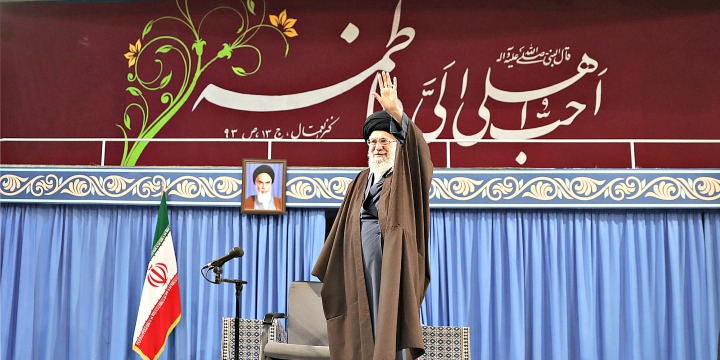Senior Iranian Official Boasts of Military Presence Abroad
 by Steven Emerson
by Steven Emerson
Iran will not back down from supporting terrorist proxies in the region and spreading its Islamic ideology abroad, a senior official in Iran’s Revolutionary Guard Corps (IRGC) has once again reiterated.
IRGC’s operations “are not limited to Iran,” Ali Fadavi, the IRGC’s naval commander, said in an interview published on Monday in the Farsi language Jamaran site and reported by Al Arabiya.
Fadavi openly discussed the fact that IRGC operatives are currently “fighting the enemy thousands of kilometers away from our borders” — an offensive force posture seen as “necessary” to spread Iran’s revolutionary ideology.
“Guarding the Islamic revolution does not only mean guarding one country and one government, i.e. Iran. The Islamic Revolutionary Guard Corps does not have any appendage attached to it and these were the orders of Imam Khomeini,” Fadavi said.
The IRGC’s primary objective is not protecting Iran’s national security, he said, but to spread Shia Islamist ideology across the entire Middle East and Muslim world.
Iran has flat out rejected any efforts to renegotiate its nuclear agreement, amid reports of European efforts last month to constrain Iran’s regional expansion and ballistic missile program.
Speaking in Tehran earlier this month, Supreme Leader Ayatollah Khamenei proclaimed that Europe and the United States have no right to discuss Iran’s regional activities. The region, Khamenei said in the same speech, belongs to Iran, not Europe.
Last month, the European Union reportedly was mulling new sanctions on Iran’s non-nuclear related activities in an effort to keep the United States from terminating the nuclear agreement.
In response, Ali Shamkhani, the secretary of Iran’s Supreme National Security Council, said that Iran “will not accept any changes, any interpretation or new measure aimed at limiting” the 2015 nuclear deal.
After a meeting in Tehran last month, Iran’s foreign minister rejected his French counterpart’s call to rein in Iran’s missile program, which was being made in an effort to preserve the nuclear agreement.
French President Emmanuel Macron and President Donald Trump met in Washington on Tuesday to discuss the Iran nuclear deal’s future. Trump called the agreement a “terrible deal,” because it did not include restrictions on Iran’s ballistic missile program or destabilizing regional activities.
But recent statements from senior Iranian officials indicate that the Islamic Republic will not stop pursuing its quest for regional hegemony.
Steven Emerson is considered one of the leading authorities on Islamic extremist networks, financing and operations. He serves as Executive Director of the Investigative Project on Terrorism, a non-profit organization that serves one of the world’s largest storehouses of archival data and intelligence on Islamic and Middle Eastern terrorist groups.
 Israel’s Iran Attack Carefully Calibrated After Internal Splits, US Pressure
Israel’s Iran Attack Carefully Calibrated After Internal Splits, US Pressure Palestinian Cameramen Exposed in New Footage Documenting Oct. 7 Atrocities Side by Side with Terrorists
Palestinian Cameramen Exposed in New Footage Documenting Oct. 7 Atrocities Side by Side with Terrorists US Money to Convicted Terrorists; US Training to Aspiring Terrorists
US Money to Convicted Terrorists; US Training to Aspiring Terrorists Man Arrested in Paris After Iran Consulate Incident
Man Arrested in Paris After Iran Consulate Incident Amazon Pulls Book by Hamas Leader Yahya Sinwar Referencing Oct. 7 Attacks After UK Lawyers Intervene
Amazon Pulls Book by Hamas Leader Yahya Sinwar Referencing Oct. 7 Attacks After UK Lawyers Intervene Israeli Government Approves Increased Payments to Returned Gaza Hostages
Israeli Government Approves Increased Payments to Returned Gaza Hostages Tehran Signals No Retaliation Against Israel After Drones Attack Iran
Tehran Signals No Retaliation Against Israel After Drones Attack Iran US Stops UN From Recognizing a Palestinian State Through Membership
US Stops UN From Recognizing a Palestinian State Through Membership Jordan Reaffirms Commitment to Peace With Israel After Iran Attack, Says Ending Treaty Would Hurt Palestinians
Jordan Reaffirms Commitment to Peace With Israel After Iran Attack, Says Ending Treaty Would Hurt Palestinians ‘Crisis at Columbia’: Elite University Spirals Into Chaos Against Backdrop of School President’s DC Testimony
‘Crisis at Columbia’: Elite University Spirals Into Chaos Against Backdrop of School President’s DC Testimony




 Palestinian Cameramen Exposed in New Footage Documenting Oct. 7 Atrocities Side by Side with Terrorists
Palestinian Cameramen Exposed in New Footage Documenting Oct. 7 Atrocities Side by Side with Terrorists US to Oppose Palestinian Bid for Full UN Membership
US to Oppose Palestinian Bid for Full UN Membership Israel’s Iran Attack Carefully Calibrated After Internal Splits, US Pressure
Israel’s Iran Attack Carefully Calibrated After Internal Splits, US Pressure ‘A Time for Vigilance’: FBI Director Says Agency on Alert for Threats Against Jewish Community During Passover
‘A Time for Vigilance’: FBI Director Says Agency on Alert for Threats Against Jewish Community During Passover ‘Crisis at Columbia’: Elite University Spirals Into Chaos Against Backdrop of School President’s DC Testimony
‘Crisis at Columbia’: Elite University Spirals Into Chaos Against Backdrop of School President’s DC Testimony